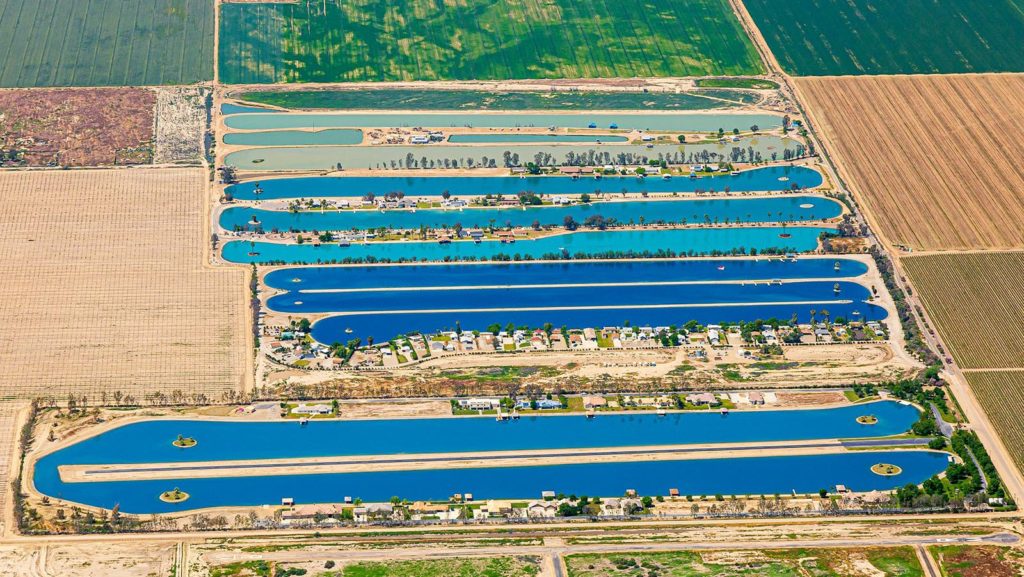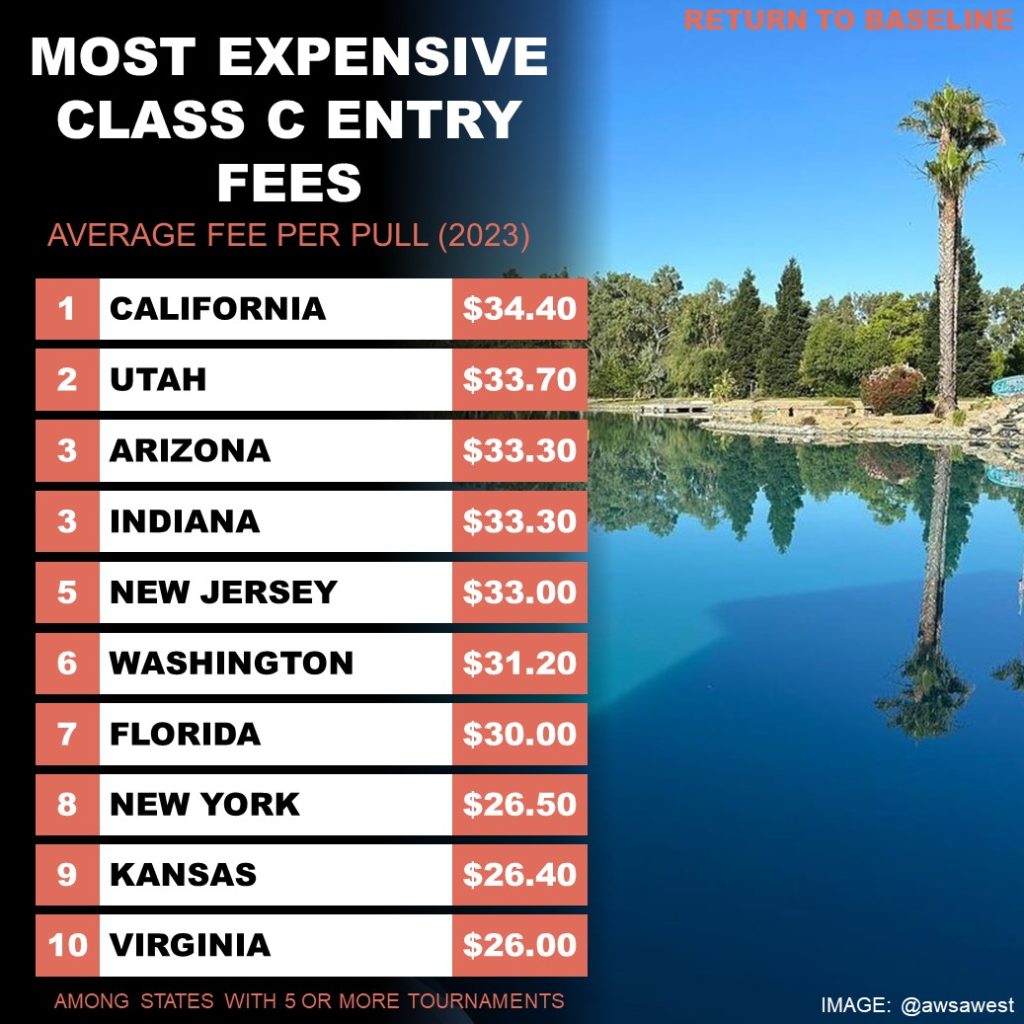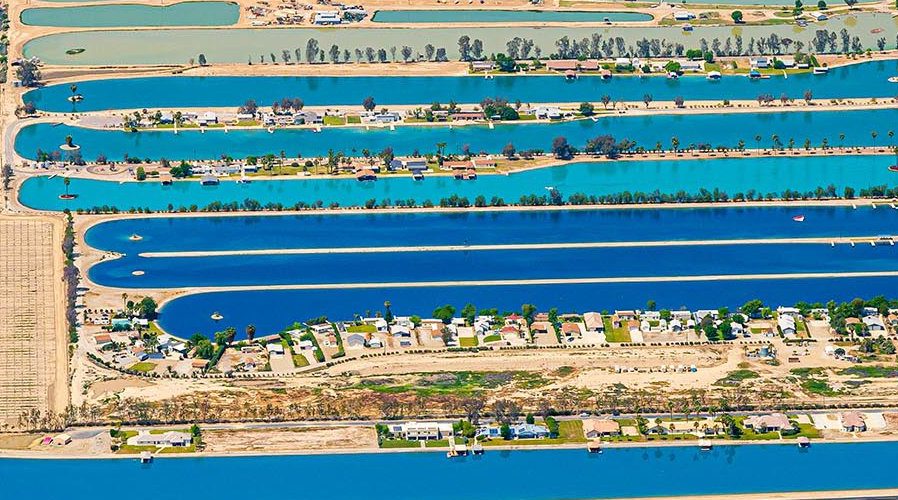California Dreamin’ – Why Does America’s West Coast Produce So Few Elite Skiers?

California’s hidden water ski lakes (image: West Coast Aerial Photography, Inc)
By Jack Burden
When it comes to water skiing, California seems to have all the ingredients for producing elite skiers: a large population, numerous skiers, abundant tournaments, a wealth of man-made water ski lakes, and enviable weather conditions, especially in Southern California that allows comfortable year-round skiing. Yet, the puzzling reality remains that America’s West Coast, including California, has only seen a handful of water skiing professionals rise to the top ranks in the last two decades. In this article, we explore the factors that contribute to this enigma.
At first glance, California seems poised to dominate the world of water skiing. It boasts the second largest number of competitive skiers and tournaments in the United States. Additionally, the presence of numerous man-made water ski lakes and the mild climate present an ideal breeding ground for ski talent. Despite these advantages, the list of elite professionals hailing from or based in California remains relatively short.
When scanning the current roster of professional water skiers, the number of prominent names emerging from California is modest. Terry Winter, Marcus Brown, and Brian Detrick are some of the notable figures of the 21st century. Young talent like Blaze Grubbs adds promise to the list, yet it’s evident that California doesn’t dominate the scene. The western region also claims Erika Lang and the Abelsons in Arizona, but the concentration of elite skiers remains highly diluted when compared to other regions.
A Historical Perspective
The history of water skiing in California boasts numerous milestones. The state hosted the first professional tournaments in the U.S. and has served as the residence for some of the sport’s most exceptional skiers, including the LaPoints, Mike Suyderhoud, and Deena Brush. Moreover, the region holds the distinction of pioneering the concept of man-made lakes for the sport. The first, Horton Lake in the Mojave Desert, was completed in 1969, and numerous others, such as Radar Lake in Washington, were excavated in the early 1970s. Notably, California emerged as a favored water ski destination in the 1980s and early 90s, housing flourishing ski schools like Suyderhoud’s and Horton’s.
The Florida Advantage
Florida’s dominance in the water skiing arena might hold the key to unraveling the California puzzle. Several factors have earned Florida its reputation as the “water skiing capital of the world,” overshadowing California. The abundance of natural water bodies, coupled with a lower cost of living, proved appealing. Florida’s proximity to the Midwest and East Coast allowed it to tap into a wider range of prospective skiers, while its accessibility to Europe became a critical advantage. California’s ski schools, although popular locally and with skiers from Australia and New Zealand, couldn’t match the network effects generated by Florida’s concentration of top-tier athletes.
The history of top skiers from California relocating to the Sunshine State is a prime example of this trend. The migration of talent has contributed to Florida’s stronghold on the sport. The Garcias, Taylor and Ali, were born and came up through the junior ranks in California but relocated to Florida to access the coaching and training opportunities of the Sunshine State. This pattern dates back much further, with icons like Rhoni Barton, the Roberges, and Deena Brush all making moves from California to Florida. This history of talent migration has reinforced Florida’s network effects, further concentrating elite skiers in the region and enhancing its competitive edge.
The Contemporary Scenario
Today, California’s water skiing landscape reflects a distinct trend. The sport has shifted towards a country-club style, predominantly taking place behind closed doors on private man-made lakes. This shift has come at a cost. The scarcity of ski clubs, coupled with some of the country’s highest tournament entry fees, has limited the sport’s accessibility. Demographics mirror this shift, with California experiencing a relative dearth of junior skiers compared to other regions.

The three most expensive states for tournament skiing are in the western region.
The scene in California serves as a microcosm for larger challenges facing the sport. The issues of accessibility, limited access to public water bodies, and the scarcity of ski clubs are emblematic of a broader struggle. While private man-made lakes provide an exclusive arena for the sport, they inadvertently contribute to its limited visibility and accessibility. The higher cost associated with these facilities hinder the involvement of a diverse range of participants. This trend is mirrored across various regions, reflecting a broader dilemma in water skiing—a balance between exclusivity and broader accessibility. Understanding these challenges within the Californian context could offer valuable insights for steering the sport towards a more inclusive future on a national and international scale.
In conclusion, California’s puzzle of producing fewer elite water skiers than expected is a complex one. While the state boasts all the prerequisites, a confluence of historical choices, geographical advantages of Florida, and changing dynamics of the sport have shaped the present scenario. Nonetheless, California remains critical to water skiing’s future as it grapples with these challenges and seeks to strike a balance between its rich legacy, the evolving demands of the sport, and the need for a more inclusive and accessible path forward.


Yup,An that’s the truth,It’s very sad to see this out here,Marine World was destroyed by this,Cypress Gardens too,Wake up or this sport will disappear.